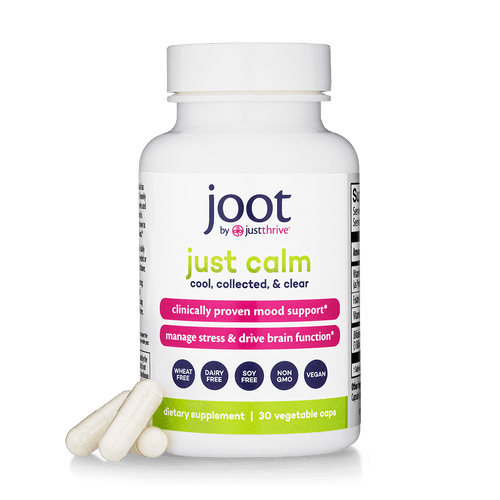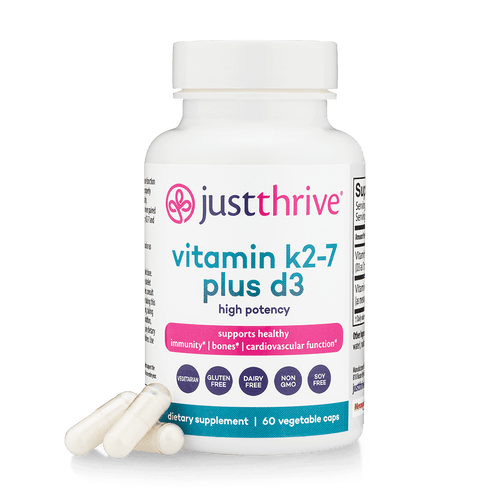From fresh green salads to salty crisp potato chips, the foods you eat have a huge impact on the way you feel.[1] Some foods – and the nutrients they deliver – help produce brain chemicals that make you feel happy, calm, and focused. Others can cloud your mind, sap your energy, and increase your risk of depression and anxiety.
So how can you tell which is which? Here’s a clear list of what to eat for mood support… what to avoid so you don’t hit a slump… plus a special “serenity now” secret ingredient that can help you feel calm, cool, and collected.
10 Foods That Can Support a Balanced Mood
Nutrient-dense foods provide the building blocks your body needs to produce feel-good brain chemicals like serotonin, dopamine, and GABA.[2] These neurotransmitters help you feel joy and calm. In fact, you can’t experience positive emotions without them.
Making some simple dietary changes can support your mood and help you fight depression and anxiety.[3] Here are 10 of the best foods for promoting positive moods:
- Dark chocolate, well-known for its mood-lifting effects, contains dozens of compounds that contribute to emotional health.[4] A study that included 13,626 adults found that eating dark chocolate reduced depressive symptoms by 57%.[5]
- Fatty cold-water fish like salmon may not seem like comfort foods, but they contain high levels of omega-3 fatty acids known to fight depression and anxiety.[6]
- Bananas, famous for their potassium content, also contain a healthy helping of tryptophan, an amino acid necessary for creating neurotransmitters like serotonin.[7]
- Blueberries are packed with nutrients and special brain-boosting plant compounds called flavonoids. Research shows that blueberries can have improve your mood within 2 hours of eating them.[8]
- Broccoli contains a powerful compound called sulforaphane that helps reduce depression and anxiety symptoms.[9]
- Oats contain a special kind of fiber called beta-glucan that has positive effects on mental and physical health. A clinical study showed that eating oats for 4 weeks reduced gloomy thoughts, anxiety, inner tension, and fatigue.[10]
- Almonds contain healthy fats, fiber, and protein that stabilize blood sugar and encourage the growth of probiotic gut bacteria – both of which help reduce symptoms of depression.[11]
- Fermented foods, such as kimchi and sauerkraut, help support a healthy gut microbiome—the trillions of bacteria in your gut—full of beneficial probiotic bacteria. Probiotic gut bacteria positively affect mood through a pathway called the gut-brain axis.[12] A study that included 26,118 people found that higher consumption of fermented foods reduced the risk and symptoms of depression, especially in men.[13]
- Green peas contain lots of fiber and nutrients including vitamin C, vitamin B6, and folate (vitamin B9). Foods rich in B vitamins like folate contribute to serotonin production, which promotes positive moods and reduces the risk of depression.[14]
- Avocados are loaded with healthy fats and jam-packed with nutrients including folate and potassium. Research shows that avocado consumption can reduce anxiety symptoms[15]
Adding this mood-supportive foods to your regular diet can help keep your mood positive and steady. But it won’t erase the impact of foods that can increase symptoms of anxiety and depression. A better move—steer clear of those mood busters.

 Want to listen instead of read?CLICK HERE
Want to listen instead of read?CLICK HERE
Avoid These 8 Mood-Busting Foods
You can probably guess which types of foods are bad for your mood. They’re the foods that generally aren’t good for you in any way. Unfortunately, these mood busters taste very good which makes them extra tough to resist, especially when you’re feeling down. But avoiding them can help improve your mood… and keep you from feeling worse.
So if you’re looking for a better mood, you’ll want to stay away from:
- Sugary drinks like soda[16]
- Refined grains
- Baked goods (like pastries)[17]
- Processed meats[18]
- Alcohol
- Energy drinks[19]
- Fried foods (sorry, French fries)[20]
- Artificial sweeteners[21]
The Secret “Ingredient” for Calm, Positive Moods
You know about comfort foods, but you may not know about the “comfort probiotic,” Bifidobacterium longum 1714™.[22] This unique probiotic specializes in keeping your mind calm, clear, focused, and bright.
B. longum 1714™ helps promote positive moods by:
- Reducing nervous brain activity and calming negative emotions[23]
- Improving the quality of your sleep[24]
- And balancing your stress response[25]
And its effectiveness has been proven in three human clinical trials:
In one German study on social anxiety, B. longum 1714™ was shown to lower occasional stress, maintain normal cortisol levels, and improve memory.
In another study involving college students, B. longum 1714™ increased sleep quality and sleep duration during a highly stressful exam week.
And in a third study, researchers used an EEG to measure electrical activity in participants' brains…
And found that taking B. longum 1714™ encouraged more theta wave activity.
This brain wave is linked to a healthy stress response and can even help you enter a flow state of effortless focus and concentration.
Enjoy Positive Moods with Just Calm
Nourishing your mind and body with the uplifting comfort of B. longum 1714™ can help you feel light, bright, calm, and focused.
And Just Calm contains 3x the clinically effective dose—more than any other product on the market. Plus, it also supplies three essential B vitamins—B6, B9, and B12—that work together to support neurotransmitter production and help your body mount a healthy stress response.
>> Try Just Calm TODAY to feel calm, cool, and collected.
And if you’re feeling unsure about trying Just Calm, we can help with that.
EVERY Just Thrive purchase is covered by our Bottom of the Bottle, 100% money back guarantee.
That means you can try Just Calm to see how well it works for you… and we’re betting that you’ll see a positive difference.
But if for any reason you’re not satisfied, simply ask for a full product refund at any time. Even if it’s 3 months or 3 years later… Even if the bottle is empty!
Sources
- Bell V, Ferrão J, Pimentel L, Pintado M, Fernandes T. One Health, Fermented Foods, and Gut Microbiota. Foods. 2018 Dec 3;7(12):195.
- Briguglio M, Dell'Osso B, Panzica G, Malgaroli A, Banfi G, Zanaboni Dina C, Galentino R, Porta M. Dietary Neurotransmitters: A Narrative Review on Current Knowledge. Nutrients. 2018 May 10;10(5):591.
- Francis HM, Stevenson RJ, Chambers JR, Gupta D, Newey B, Lim CK. A brief diet intervention can reduce symptoms of depression in young adults - A randomised controlled trial. PLoS One. 2019 Oct 9;14(10):e0222768. doi: 10.1371/journal.pone.0222768. PMID: 31596866; PMCID: PMC6784975.
- Tuenter E, Foubert K, Pieters L. Mood Components in Cocoa and Chocolate: The Mood Pyramid. Planta Med. 2018 Aug;84(12-13):839-844.
- Jackson SE, Smith L, Firth J, Grabovac I, Soysal P, Koyanagi A, Hu L, Stubbs B, Demurtas J, Veronese N, Zhu X, Yang L. Is there a relationship between chocolate consumption and symptoms of depression? A cross-sectional survey of 13,626 US adults. Depress Anxiety. 2019 Oct;36(10):987-995.
- Larrieu T, Layé S. Food for Mood: Relevance of Nutritional Omega-3 Fatty Acids for Depression and Anxiety. Front Physiol. 2018 Aug 6;9:1047.
- Hulsken S, Märtin A, Mohajeri MH, Homberg JR. Food-derived serotonergic modulators: effects on mood and cognition. Nutr Res Rev. 2013 Dec;26(2):223-34.
- Khalid S, Barfoot KL, May G, Lamport DJ, Reynolds SA, Williams CM. Effects of Acute Blueberry Flavonoids on Mood in Children and Young Adults. Nutrients. 2017 Feb 20;9(2):158.
- Wu S, Gao Q, Zhao P, Gao Y, Xi Y, Wang X, Liang Y, Shi H, Ma Y. Sulforaphane produces antidepressant- and anxiolytic-like effects in adult mice. Behav Brain Res. 2016 Mar 15;301:55-62.
- Wolever TMS, Rahn M, Dioum EH, Jenkins AL, Ezatagha A, Campbell JE, Chu Y. Effect of Oat β-Glucan on Affective and Physical Feeling States in Healthy Adults: Evidence for Reduced Headache, Fatigue, Anxiety and Limb/Joint Pains. Nutrients. 2021 May 1;13(5):1534.
- Ren M, Zhang H, Qi J, Hu A, Jiang Q, Hou Y, Feng Q, Ojo O, Wang X. An Almond-Based Low Carbohydrate Diet Improves Depression and Glycometabolism in Patients with Type 2 Diabetes through Modulating Gut Microbiota and GLP-1: A Randomized Controlled Trial. Nutrients. 2020 Oct 3;12(10):3036.
- Luo Y, Li Z, Gu L, Zhang K. Fermented dairy foods consumption and depressive symptoms: A meta-analysis of cohort studies. PLoS One. 2023 Feb 6;18(2):e0281346.
- Kim CS, Shin DM. Probiotic food consumption is associated with lower severity and prevalence of depression: A nationwide cross-sectional study. Nutrition. 2019 Jul-Aug;63-64:169-174. doi: 10.1016/j.nut.2019.02.007. Epub 2019 Feb 19. PMID: 31029044.
- Young SN. Folate and depression--a neglected problem. J Psychiatry Neurosci. 2007 Mar;32(2):80-2. PMID: 17353937; PMCID: PMC1810582.
- Elsadek, MF. Investigating the Avocado (Persea americana) fruit's anti-anxiety potentials in rat models. Journal of King Saud University - Science. Volume 35, Issue 2, February 2023, 102504
- Zhang X, Huang X, Xiao Y, Jing D, Huang Y, Chen L, Luo D, Chen X, Shen M. Daily intake of soft drinks is associated with symptoms of anxiety and depression in Chinese adolescents. Public Health Nutr. 2019 Oct;22(14):2553-2560. doi: 10.1017/S1368980019001009. Epub 2019 May 17. PMID: 31097051.
- Knüppel, A., Shipley, M.J., Llewellyn, C.H. et al. Sugar intake from sweet food and beverages, common mental disorder and depression: prospective findings from the Whitehall II study. Sci Rep 7, 6287 (2017).
- Nucci D, Fatigoni C, Amerio A, Odone A, Gianfredi V. Red and Processed Meat Consumption and Risk of Depression: A Systematic Review and Meta-Analysis. Int J Environ Res Public Health. 2020 Sep 14;17(18):6686.
- Kaur S, Christian H, Cooper MN, Francis J, Allen K, Trapp G. Consumption of energy drinks is associated with depression, anxiety, and stress in young adult males: Evidence from a longitudinal cohort study. Depress Anxiety. 2020 Nov;37(11):1089-1098. doi: 10.1002/da.23090. Epub 2020 Aug 26. PMID: 32845046.
- Wang A, Wan X, Zhuang P, Jia W, Ao Y, Liu X, Tian Y, Zhu L, Huang Y, Yao J, Wang B, Wu Y, Xu Z, Wang J, Yao W, Jiao J, Zhang Y. High fried food consumption impacts anxiety and depression due to lipid metabolism disturbance and neuroinflammation. Proc Natl Acad Sci U S A. 2023 May 2;120(18):e2221097120.
- Choudhary AK, Lee YY. Neurophysiological symptoms and aspartame: What is the connection? Nutr Neurosci. 2018 Jun;21(5):306-316. doi: 10.1080/1028415X.2017.1288340. Epub 2017 Feb 15. PMID: 28198207.
- Allen, A., Hutch, W., Borre, Y. et al. Bifidobacterium longum 1714 as a translational psychobiotic: modulation of stress, electrophysiology and neurocognition in healthy volunteers. Transl Psychiatry 6, e939 (2016). https://doi.org/10.1038/tp.2016.191
- Wang H, Braun C, Murphy EF, Enck P. Bifidobacterium longum 1714™ Strain Modulates Brain Activity of Healthy Volunteers During Social Stress. Am J Gastroenterol. 2019 Jul;114(7):1152-1162.
- Moloney GM, Long-Smith CM, Murphy A, Dorland D, Hojabri SF, Ramirez LO, Marin DC, Bastiaanssen TFS, Cusack AM, Berding K, Fouhy F, Allen AP, Stanton C, Clarke G, Dinan TG, Cryan JF. Improvements in sleep indices during exam stress due to consumption of a Bifidobacterium longum. Brain Behav Immun Health. 2020 Nov 13;10:100174.
- Groeger D, Murphy EF, Tan HTT, Larsen IS, O'Neill I, Quigley EMM. Interactions between symptoms and psychological status in irritable bowel syndrome: An exploratory study of the impact of a probiotic combination. Neurogastroenterol Motil. 2023 Jan;35(1):e14477. doi: 10.1111/nmo.14477. Epub 2022 Sep 30. PMID: 36178333; PMCID: PMC10078522.














